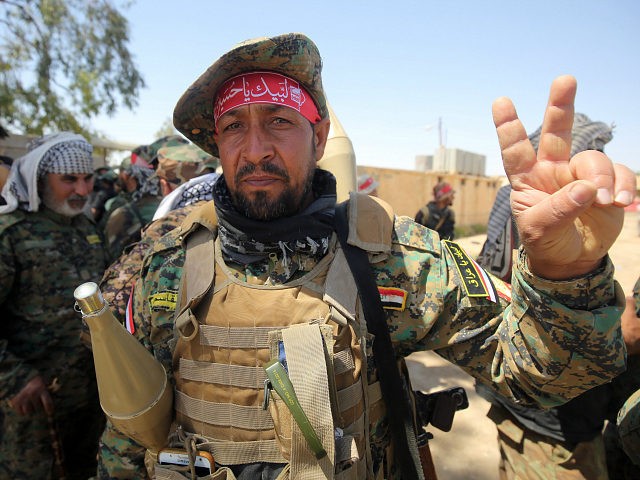Iran-backed Shiite paramilitary troops, sanctioned by Baghdad, say they have pushed the Islamic State (ISIS/ISIL) out of several villages west of Mosul, advancing further towards Iraq’s border with Syria.
“Iraq’s government is aiming to control the border area with Syria in coordination with the Iranian-backed army of Syrian President Bashar al-Assad,” reports Reuters. “Linking up the two sides would give Assad a significant advantage in fighting the six-year rebellion against his rule.”
In March, experts estimated the strength of the Iran-allied Popular Mobilization Units (PMU) in Iraq to be between 100,000 and 120,000 fighters. The PMU is also known as the Popular Mobilization Forces (PMF) and Hashd al-Shaabi.
Since the offensive to retake Mosul from Sunni ISIS started in October, PMU fighters have been fighting alongside U.S.-backed local forces to defeat the terrorist group in Mosul and the surrounding villages in northern Iraq’s Nineveh province.
Mosul, considered the last major ISIS bastion in Iraq, is the provincial capital of Sunni-majority Nineveh. Amid the ongoing Mosul offensive, the Shiite-led Iraqi Parliament enacted a law in November making the PMU legal and placing them under the umbrella of the Iraqi armed forces.
The PMU force, which has Iranian military advisers, nominally reports to the Shiite-led government in Baghdad.
Before the Iraqi Parliament sanctioned the PMU as an official wing of the country’s military, the force had been considered an umbrella for a diverse array of predominantly Shiite militias largely dominated by Iranian-aligned groups.
Human rights watchdog groups such as Amnesty International have accused the PMU of committing war crimes against Sunni civilians.
Nevertheless, the U.S. military has praised the Iran-affiliated Shiite force for its contribution to the ongoing operation to retake Mosul.
Amnesty International recently learned that, back in September, the U.S. Army lost track of an estimated $1 billion worth of weapons and military equipment destined for the Iraqi armed forces and their allies, including the PMU.
Federal law prohibits the U.S. from providing military assistance to Iraqi groups associated with the government of Iran.
Leaders from the mainly Sunni Kurdish community in the region and Arab tribal heads in Nineveh province have expressed concern about the presence of the PMU in Iraq.
Meanwhile, the PMU troops appear to be intent on retaining control of some of the Iraqi territory they liberate from ISIS after the Sunni group is defeated.
Kurdish military commander Colonel Sirwan Muhammad told Rudaw in February he had reason to believe the PMU was in northern Iraq “to fight” the Kurdish Peshmerga forces “when ISIS are gone.”
Some experts, including Dr. Michael Knights, a fellow at the Washington Institute for Near East Policy, have warned U.S. lawmakers that the PMU fighters in Iraq pose a threat to American interests in the region.
On the day before the Mosul offensive started in October 2016, Nineveh Sheikh A’hd al-Khalidi told Rudaw that the residents of the province “are concerned and fear for what will happen after ISIS. The possibility of personal revenge makes people afraid.”
“[Arab] tribal leaders of Nineveh province called the international community to distance Popular Mobilization militias from Mosul and its suburbs and stop Iranian expansion in the region,” reported Al Arabiya last week, adding, “The tribes accused the popular mobilization militias of bulldozing houses and stealing properties in captured areas west of Mosul.”

COMMENTS
Please let us know if you're having issues with commenting.